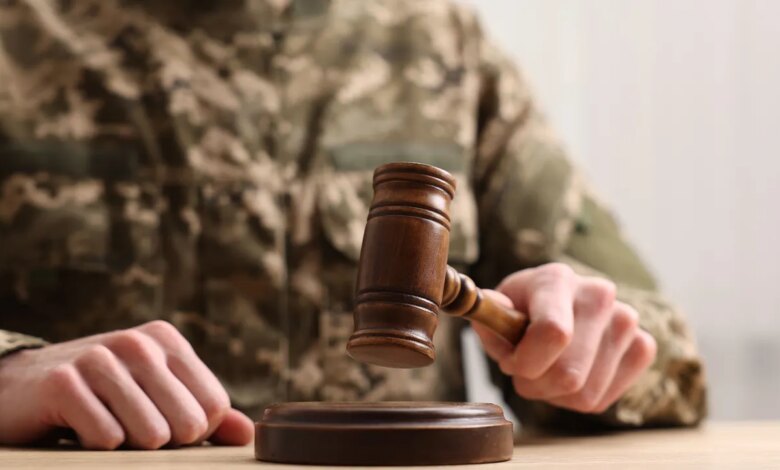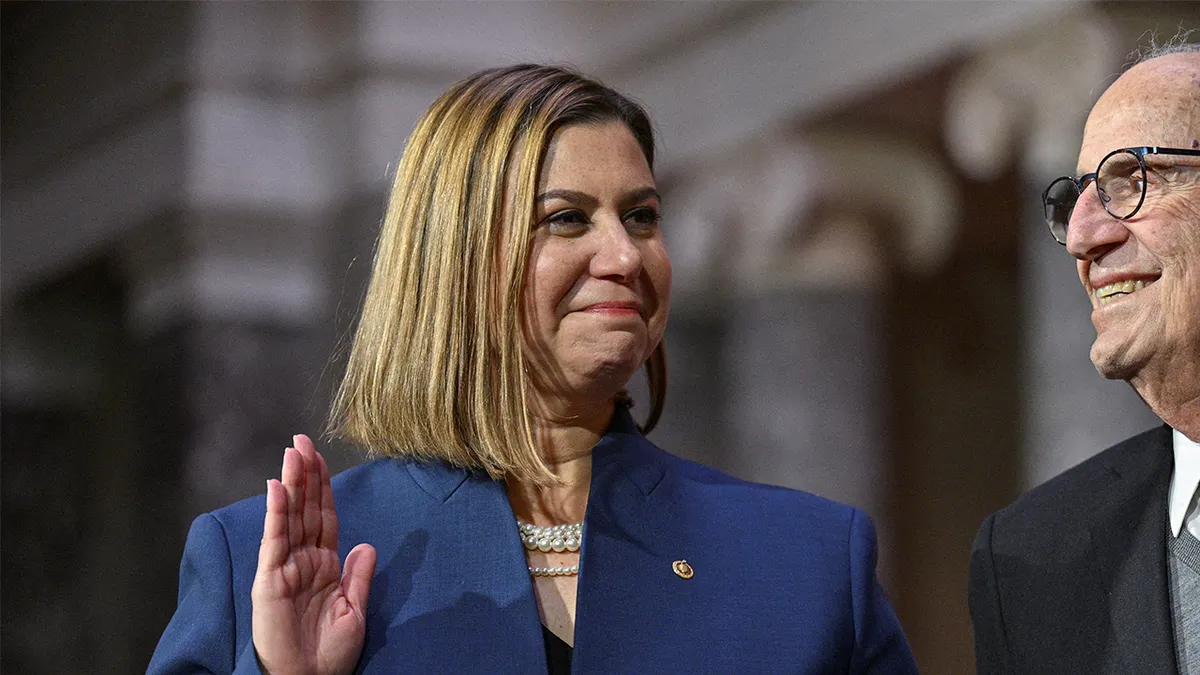Experts: Troops face court-martial over advice on ‘illegal orders’

NEWYou can now listen to Fox News articles!
President Donald Trump said the viral video of Democratic senators urging the military to “refuse unlawful orders” should be “punishable by the death penalty,” intensifying outrage across the political spectrum — and confusion over what such advice might actually mean under federal law.
While the lawmakers behind the video — led by Sen. Elissa Slotkin, Democrat of Michigan, and joined by Sen. Mark Kelly, Democrat of Arizona, and several Democratic House veterans and intelligence officers — framed the call as a defense of the Constitution, military legal codes make clear that refusing orders, even those a service member personally believes to be illegal, can result in devastating penalties.
“You can’t expect a sailor to override the lawyers in Washington,” Rachel VanLandingham, a retired Air Force JAG and professor at Southwestern Law School, told Fox News Digital. “That’s why it’s unfair to put the burden on the military rather than policymakers.”
Under the Uniform Code of Military Justice (UCMJ), a body of law that governs all members of the U.S. armed forces, obedience to orders is not optional – except in the most limited cases where the illegality is “manifest” or indisputably obvious. In practice, this distinction means that most soldiers risk being punished if they refuse an order before a court or higher authority has deemed it illegal.
DANGEROUS WAR GAMES: TELLING SERVICE MEMBERS TO RESIST Trump INVITES PURE CHAOS
Article 90 of the UCMJ states that any service member who “willfully disobeys a lawful order” of a superior officer may be sentenced to imprisonment for up to five years, loss of all pay and allowances, and dishonorable discharge. If the offense occurs during wartime, the punishment may be death or any lesser punishment imposed by court martial.

While the lawmakers behind the video framed the call as a defense of the Constitution, military legal codes make clear that refusing orders can still result in devastating penalties. (Reuters)
Article 92 – “Failure to Obey an Order or Regulation” – adds that disobedience of any lawful order or regulation can also result in court martial, with penalties including forfeiture of salary, demotion and up to two years of imprisonment. These provisions, military lawyers say, form the backbone of discipline and chain of command — the very system that the senators’ video appears to call into question.
The law leaves little room for simple good intentions.
“There is no obligation to obey an illegal order, but a subordinate who disobeys based on that belief takes an immense risk of being convicted by court-martial unless he or she can prove that the order was truly illegal,” said Geoffrey Corn, a law professor at Texas Tech and director of the university’s Center for Military Law and Policy.
The opposite error can be just as destructive. Under Article 77, military personnel who carry out an illegal order can be punished as “principals,” meaning they share the same criminal liability as the commander who gave the order.
This principle – established after World War II – rejects the idea that “merely following orders” constitutes a defense.
GRAHAM ASKS DEMOCRATS TO EXPLAIN “REFUSE ILLEGAL ORDERS” MESSAGE TO TROOPS
If an order violates the Constitution, the law of armed conflict, or the rights of American citizens, obedience offers no protection. A service member who follows such a directive could be prosecuted for war crimes or neglect of duty under Article 134, the broad “general article” of the UCMJ covering conduct that discredits the armed forces.
Military law sets extremely high standards for refusing an order: it must be manifestly illegal – so clearly illegal that “a person of common sense and ordinary understanding” would recognize it as a crime on its face. Examples include orders to kill civilians, torture detainees, or overthrow the government.
In contrast, orders to deploy troops, enforce federal authority, or carry out presidential directives are presumed legal unless specifically prohibited by law or court decision.
“There is a presumption that military orders are lawful,” said Victor Hansen, a former Army judge advocate general (JAG) and professor at New England Law Boston. “A defense only exists if the order is manifestly illegal – something clearly criminal, like an order to kill a prisoner of war. That’s where the duty to disobey applies.”
Hansen said the military is unable to interpret the legality of a president’s decisions regarding deployments or strikes. “If a soldier came to me after seeing this video, I would tell him: don’t do anything different from what you’re already doing,” he said. “It is not your role to question the political reasons behind a decision to use force.”
The one-minute “Don’t Abandon Ship” video tells the military and intelligence services: “You can refuse illegal orders. You must refuse illegal orders. » It never defines which orders qualify — even as the same lawmakers push legislation limiting Trump’s ability to deploy National Guard units or carry out anti-narcoterrorist strikes abroad.
Conservatives quickly accused the group of encouraging insubordination.
Secretary of War Pete Hegseth responded on X: “TDS Level 4,” referring to what the president’s supporters call “Trump Derangement Syndrome.”
At the Pentagon, officials have long warned that calls for troops to interpret legality for themselves can undermine civilian control of the military — a bedrock of the U.S. constitutional order. Current regulations require service members to immediately seek legal advice through their chain of command or the Office of the Judge Advocate General before refusing a directive, unless there is clear criminality.
Retired Maj. Gen. Steven Lepper, a former deputy JAG, said the Democrats’ message “merely restates existing law” but risks creating confusion about who is truly responsible.

Senator Mark Kelly, a former Navy captain, urged troops to refuse “unlawful orders” in the viral video. (Eric Lee/Bloomberg)
“There is a strong presumption that military orders are legal,” Lepper said. “This is normal, because if the presumption went the other way, our army would be hopelessly weakened.”
In 1968, American troops massacred hundreds of unarmed civilians in the Vietnamese village of My Lai, a crime that their commanders initially tried to cover up. When the murders came to light, 1st Lt. William Calley was convicted of murder despite claiming to have followed orders – a case that taught generations of soldiers that some orders are so clearly criminal that they must be refused.
Decades later, the abuse scandal at Iraq’s Abu Ghraib prison exposed another breakdown in command accountability. Reservists at a US detention center humiliated and assaulted detainees in what they believed to be authorized interrogation practices.
Eleven soldiers were court-martialed, while top officials escaped prosecution — a stark reminder, military lawyers say, of how ambiguous orders and weak control can still lead troops to commit criminal acts.
VanLandingham called the video “careless and dangerous,” saying it misrepresents how limited the legal duty to refuse orders is.
“The military has no legal obligation to follow illegal orders,” she said. “But the universe of orders that are so blatantly or blatantly illegal that a soldier with ordinary understanding would recognize them as such is very small – that’s intentional. The military depends on obedience.”
She said this principle, born from the Nuremberg trials after the Holocaust, remains the foundation of modern military law – a reminder that obedience can never excuse crimes “so blatantly illegal that anyone with ordinary understanding would recognize them as such.”

VanLandingham said the norm becomes even blurrier in modern conflicts, citing U.S. strikes on suspected narcotics-trafficking boats in the Caribbean and off the coast of Venezuela. These missions, she added, may be illegal under international law but will not appear blatantly illegal to the troops charged with carrying them out. » (Secretary of War via X)
VanLandingham said the norm becomes even blurrier in modern conflicts, citing U.S. strikes on suspected narcotics-trafficking boats in the Caribbean and off the coast of Venezuela. These missions, she added, may be illegal under international law, but will not appear blatantly illegal to the troops charged with carrying them out. “
“They disobey at their peril,” VanLandingham added. “If they refuse an order they believe is illegal, they risk their careers, their family’s income, or even a court martial. But if they obey, they could later be charged with a crime. It’s a trap, and it’s unfair to expect the military to carry that burden.”
“Don’t go after the troops,” VanLandingham said. “Prosecute policymakers who issue illegal orders. Congress should control the executive branch, not ask soldiers and lieutenants to decide what is legal.”
CLICK HERE TO DOWNLOAD THE FOX NEWS APP
For individual troops, the stakes are high. Refusing a lawful order – or obeying an illegal order – can end a career, result in years of incarceration and wipe out veterans’ benefits.
While senators claim to be defending their constitutional duty, the UCMJ leaves little room for personal interpretation – and leaves no room for those who are wrong.



